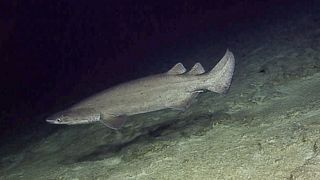
Cordillera de Coiba, Pacific Panama.
(Image credit: Cavan Images via Getty Images)
Rarely-seen deep-sea sharks have been spotted mysteriously gathering off a seamount near Panama — the first time the species has ever been documented in the area.
In a study published March 8 in the Journal of Fish Biology, scientists confirmed the “atypical” gathering of 12 prickly sharks (Echinorhinus cookei) in the Cordillera de Coiba, Pacific Panama — a 26,000-square-mile (68,000 square kilometers) offshore marine protected area that includes nine mountain ranges, 24 seamounts and a 15,568-foot-deep (4,745 meters) trench.
The elusive prickly sharks, which have bodies covered by thorny, modified teeth, grow up to to 13 feet (4 m) long and may inhabit depths of up to 3,280 feet (1,000 m). “They prefer to be in deeper waters,” which makes them difficult to observe, study author Héctor Guzmán, a marine ecologist at Smithsonian Tropical Research Institute, told Live Science. Although information on the distribution of this species is scarce, they have been observed from Oregon and Japan in their northerly range down to Chile and New Zealand.
Scientists believe these gatherings, which took place in May 2022 between 495 and 1,146 feet (151 to 350 m) deep, were “deliberate.” . Before this discovery, there had been no evidence that these sharks aggregated. The researchers aren’t sure why the sharks were coming together, but it could be to do with feeding. “We saw juvenile hammerheads down there and those are easy targets for the prickly,” Guzmán said. It could also be linked to reproduction. The team checked the sharks’ claspers — modified pelvic fins used in reproduction — to confirm that both male and female sharks were at the gatherings.
Related: Watch a super-rare dreamer anglerfish with ultra-black ‘invisibility cloak’ swim like a shadow in the deep sea

Prickly shark, Echinorhinus cookei. (Image credit: NOAA Okeanos Explorer)
The researchers observed the gatherings as they explored two seamounts on the Cordillera de Coiba, not far from Colombian waters, during 11 dives in a three-person submersible — with a camera and robotic arm to collect samples.
Confirming the presence of prickly sharks around these seamounts is important for the conservation of these biodiversity hotspots. “It helps us to justify why we’re protecting these highly productive systems,” Guzmán said, because focusing on protecting the whole habitat would, in turn, help all the species that use it.
Get the world’s most fascinating discoveries delivered straight to your inbox.
But although the seamount is located inside a no-take zone — where no fishing is allowed — the researchers saw a Colombian vessel illegally fishing nearby for two consecutive days. “We got imagery of the back of [the vessel] where they had plenty of fins of several species of shark” and reported it to the Colombian authorities, he said.
This highlights an important issue. Although the area is protected, it’s located in the open ocean, far from the coastline. “There’s no way you can have a patrol boat with a couple of rangers in that area,” Guzmán said. This is why their project uses satellites to monitor fishing, to enforce protections that are in place on paper, he added.
Melissa Hobson is a freelance writer who specializes in marine science, conservation and sustainability, and particularly loves writing about the bizarre behaviors of marine creatures. Melissa has worked for several marine conservation organizations where she soaked up their knowledge and passion for protecting the ocean. A certified Rescue Diver, she gets her scuba fix wherever possible but is too much of a wimp to dive in the UK these days so tends to stick to tropical waters. Her writing has also appeared in National Geographic, the Guardian, the Sunday Times, New Scientist, VICE and more.
>>> Read full article>>>
Copyright for syndicated content belongs to the linked Source : Live Science – https://www.livescience.com/animals/sharks/elusive-prickly-sharks-spotted-gathering-at-underwater-mountain-off-panama-but-why-remains-a-mystery










